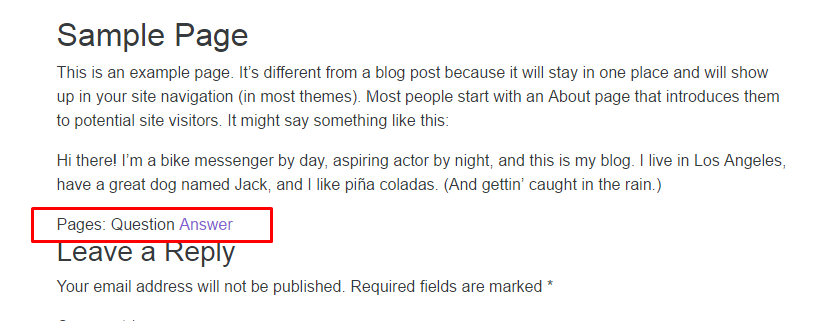Put this function in you functions.php -
function the_dramatist_wp_link_pages( $args = '' ) {
global $page, $numpages, $multipage, $more;
$defaults = array(
'before' => '<p>' . __( 'Pages:' ),
'after' => '</p>',
'link_before' => '',
'link_after' => '',
'next_or_number' => 'number',
'separator' => ' ',
'nextpagelink' => __( 'Next page' ),
'previouspagelink' => __( 'Previous page' ),
'pagelink' => '%',
'echo' => 1
);
$params = wp_parse_args( $args, $defaults );
/**
* Filters the arguments used in retrieving page links for paginated posts.
*
* @since 3.0.0
*
* @param array $params An array of arguments for page links for paginated posts.
*/
$r = apply_filters( 'wp_link_pages_args', $params );
$output = '';
if ( $multipage ) {
if ( 'number' == $r['next_or_number'] ) {
$output .= $r['before'];
for ( $i = 1; $i <= $numpages; $i++ ) {
if ( $i % 2 == 0) {
$link = $r['link_before'] . str_replace( '%', 'Answer', $r['pagelink'] ) . $r['link_after'];
} else {
$link = $r['link_before'] . str_replace( '%', 'Question', $r['pagelink'] ) . $r['link_after'];
}
if ( $i != $page || ! $more && 1 == $page ) {
$link = _wp_link_page( $i ) . $link . '</a>';
}
/**
* Filters the HTML output of individual page number links.
*
* @since 3.6.0
*
* @param string $link The page number HTML output.
* @param int $i Page number for paginated posts' page links.
*/
$link = apply_filters( 'wp_link_pages_link', $link, $i );
// Use the custom links separator beginning with the second link.
$output .= ( 1 === $i ) ? ' ' : $r['separator'];
$output .= $link;
}
$output .= $r['after'];
} elseif ( $more ) {
$output .= $r['before'];
$prev = $page - 1;
if ( $prev > 0 ) {
$link = _wp_link_page( $prev ) . $r['link_before'] . $r['previouspagelink'] . $r['link_after'] . '</a>';
/** This filter is documented in wp-includes/post-template.php */
$output .= apply_filters( 'wp_link_pages_link', $link, $prev );
}
$next = $page + 1;
if ( $next <= $numpages ) {
if ( $prev ) {
$output .= $r['separator'];
}
$link = _wp_link_page( $next ) . $r['link_before'] . $r['nextpagelink'] . $r['link_after'] . '</a>';
/** This filter is documented in wp-includes/post-template.php */
$output .= apply_filters( 'wp_link_pages_link', $link, $next );
}
$output .= $r['after'];
}
}
/**
* Filters the HTML output of page links for paginated posts.
*
* @since 3.6.0
*
* @param string $output HTML output of paginated posts' page links.
* @param array $args An array of arguments.
*/
$html = apply_filters( 'wp_link_pages', $output, $args );
if ( $r['echo'] ) {
echo $html;
}
return $html;
}
And then go to your theme directory. Search and replace the wp_link_pages function names with the_dramatist_wp_link_pages. And it'll work as you wanted. Usually the wp_link_pages exists in content-{template-name}.php. So if you have any of those files in your theme please look at theme first. Here I've added a screenshot-
And after that you do your styling. Have fun.
The function works on odd-even basis. It considers the odd part as 'Question' and the even part as 'Answer'

